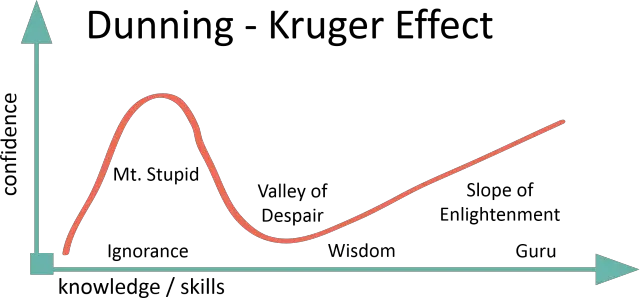
It is December 20th, 1954. There are 16 people sitting in a small house on the outskirts of Chicago. The majority of them are waiting for the clock to strike midnight, because that's when they expect the arrival of Sananda, the alien from the planet Clarion coming to rescue them before a giant flood kills every living thing on the planet.
Some of them are not expecting Sananda, however. Social psychologist Leon Festinger and two research assistants are in the crowd to study what happens when prophecy fails, and they're logging the apocalyptic event into their notebooks on a minute to minute basis. Let's read Festinger's notes as we transition to past tense (this did, after all, happen almost 70 years ago):
Prior to December 20. The group shuns publicity. Interviews are given only grudgingly. Access to Keech's house is only provided to those who can convince the group that they are true believers. The group evolves a belief system -- provided by the automatic writing from the planet Clarion -- to explain the details of the cataclysm, the reason for its occurrence, and the manner in which the group would be saved from the disaster.
December 20. The group expects a visitor from outer space to call upon them at midnight and to escort them to a waiting spacecraft. As instructed, the group goes to great lengths to remove all metallic items from their persons. As midnight approaches, zippers, bra straps, and other objects are discarded. The group waits.
12:05 A.M., December 21. No visitor. Someone in the group notices that another clock in the room shows 11:55. The group agrees that it is not yet midnight.
12:10 A.M. The second clock strikes midnight. Still no visitor. The group sits in stunned silence. The cataclysm itself is no more than seven hours away.
4:00 A.M. The group has been sitting in stunned silence. A few attempts at finding explanations have failed. Keech begins to cry.
4:45 A.M. Another message by automatic writing is sent to Keech. It states, in effect, that the God of Earth has decided to spare the planet from destruction. The cataclysm has been called off: "The little group, sitting all night long, had spread so much light that God had saved the world from destruction."
Cognitive dissonance
You might think that only the least intelligent of the group would be able to swallow that excuse. But every single one of them did. Festinger's next note reads thus:
Afternoon, December 21. Newspapers are called; interviews are sought. In a reversal of its previous distaste for publicity, the group begins an urgent campaign to spread its message to as broad an audience as possible.
The people who had been sitting waiting for Sananda had quit their jobs, left their families, and generally given away all their worldly goods. They had invested a huge portion of themselves and their future into the notion that they would soon be living on Clarion with their space friends. Their personalities were so bound up with the extraterrestrial savior that removing him would be catastrophic.
When confronted with the fact that they had got the whole end of the world thing very, very wrong, they acted as though they were more sure than ever that they were right. Festinger noted that rather than alter their beliefs to accommodate new information, they simply altered the information to accommodate their beliefs.
This is of course an obvious application of the phenomenon to organized religion, but it also works in less ethereal areas. Remember that friend who simply couldn't believe that his girlfriend was cheating on him? When you're dealing with something that is very important to you, that is a big part of your life, your perception is terribly compromised.
Malleable memories
One of the earliest memories I can recall is being on holiday and my dad taking me to see a James Bond film. I don't remember much about it -- mainly standing around inside the cinema with an ice cream. But I do remember it. I can picture it in my head right now.

The only problem is that I know for a fact it didn't happen.
The false memory could have come to me through something I've read or fantasized about. Maybe it was even constructed from a dream. I would love to be able to genealogically chart the apogenesis of the ice cream at the James Bond movie memory.
In the 1970's, psychologist Elizabeth Luftus looked into how easy it is to manipulate memories. She showed subjects a series of pictures that showed a car approaching a junction, going through a stop sign, and then hitting a pedestrian. She then asked the subjects if they could remember the color of the car that had driven through the give way sign.
Later she showed the subjects two pictures. One with the original stop sign junction -- and one modified to have a give way sign. Over 80% chose the false give way picture. She had successfully altered their memory.
Since then psychologists have been messing with people's memories in increasingly advanced ways. A Victoria University study obtained early teenage pictures of their subjects and digitally inserted them into a hot air balloon. They included the fake in a series of genuine childhood pictures and asked the subject to tell them what the could remember about the photographs.
At first, nearly everyone said they couldn't remember the hot air balloon ride. But when the researchers performed follow up interviews a week later a quarter claimed that it was starting to come back to them. A week after that, more than half could remember the fictitious balloon ride. Some were recalling the incident in surprising clarity, furnishing it with details about how much their father paid for it, who was taking the picture, and how scared they were. Like my not real cinema trip, this balloon ride had become a convincing part of their past.
The human brain is not a hard drive, and it doesn't store information in fixed state until it is needed. Our ego, our subconscious, and a few hundred external stimuli all morph and twist our memories over the years and sadly, this fuzziness leaves us susceptible to suggestion and manipulation. Take the phenomenon of hypnotists regressing people into past lives, or them "helping" people to recall alien abductions, to see how easily we can be bamboozled.
Just because you remember it doesn't mean it happened.
The Dunning-Kruger effect
When I was a teenager I had a job working in the stockroom of a shop. The stockroom manager thought that he was the funniest guy in the world. One time he stood beside me and produced a Britney Spears doll (shop sold toys) and proceeded to simulate oral sex with the doll. He would press the button to make her say "Hit me baby one more time," while he slobbered over it, giggling to himself with the sheer hilarity of it all.
It was one of the most grim things I've ever seen, I'm still convinced I'll one day see him plastered all over the news, sentenced to 20 years for raping a mannequin in a shop window in front of schoolchildren. He was the same with everyone. How could he keep on doing that kind of crap even while receiving nothing but blank or downright terrified expressions in return and -- still believe himself to be wittier than Wilde and sharper than Swift?
It was the Dunning-Kruger effect.

Chances are you'll have had a little bit of Dunning-Kruger within yourself at some point. The six months after you passed your driving test is usually a good example. How many felt like motoring gods the day they passed the test only to come crashing back down to reality the minute they wrapped mom's Fiesta around a tree while trying that handbrake turn they totally mastered in Colin McRae?
Sadly, the Dunning-Kruger effect is actually a handy thing to have. Researchers have shown that during job interviews, especially for higher ranking posts, confidence is one of the most important qualities an interviewee can have. Ever wondered how your incompetent boss managed to get into a position of authority? Or what about this absolute specimen:
So trust no one. Not even yourself. Even if you are the president of the United States of America.




i thought i was just an stinking lier.
Speak for yourselves lol
Human societies have always had checks and balances through external forces competing with them. We are living the creation of a global society with no checks or balances whatsoever. Killing yourself to get a boarding ticket for the Hale-bopp spaceship will seem rational compared to what's to come.
this is a garbage article. you're a poor writer.
mt. stupid
lol, permanent Mt Stupid